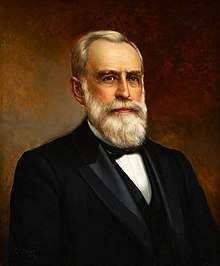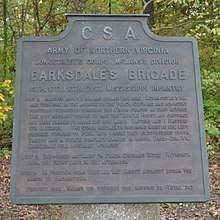William Dunbar Holder
William Dunbar Holder (March 6, 1824 – April 26, 1900) was a prominent Confederate politician and soldier.
William Dunbar Holder | |
|---|---|
 Portrait of William D. Holder by Andres Molinary | |
| Born | March 6, 1824 |
| Died | April 26, 1900 (aged 76) |
| Occupation | lawyer |

Biography
Holder was born in Franklin County, Tennessee, but later moved to Mississippi. He served in the state legislature in 1853 and was a colonel in the Confederate States Army in the American Civil War. In 1862, he led the 17th Mississippi Infantry Regiment in the Missouri Brigade of General Charles Clark and was wounded in the Battle of Malvern Hill.[1] He resigned his commission after another wound sustained during the Battle of Gettysburg where he commanded the 17th Mississippi Infantry, as part of Barksdale's Mississippi Brigade.[2] In a letter to The Clarion-Ledger in October 1886, Holden wrote the following,
Barksdale’s brigade, in line of battle on the day in question, stood thus: Extreme left, 13th Mississippi Regiment, Colonel Carter; 17th, Colonel Holder; 18th, Colonel Griffin; 21st, Colonel Humphreys. Colonel Griffin was wounded in the leg, Colonel Carter killed on the field, and Gen. Barksdale fell in the midst of his gallant old 13th Regiment. ... They dared to go where duty called, and knew by the crucial test of many an ensanguined field, that their regiments would stand by them to the bitter end.[3]
Holder represented the state in the Second Confederate Congress from 1864 to 1865. He served as a state auditor in 1890–1896.
He died in Jackson, Mississippi on April 26, 1900.[4]
Family
He married Catharine Theresa Bowles (1837-1887) and they had six sons and one daughter.[5]
References
- Albert Lucian Lewis. The Confederate Congress, a Study in Personnel, Volume 2, University of Southern California, 1955, p. 221
- Kent Masterson Brown. Retreat from Gettysburg (2011), p. 54.
- The Clarion-Ledger, October 6, 1886
- Biographical Guide to the Mississippi Hall of Fame. Published during the 33rd Anniversary Year of the Mississippi Department of Archives and History, 1935, p. 28.
- Tennessee: The Volunteer State, 1769-1923, Volume 2, by John Trotwood Moore and Austin Powers Foster, 1923, pp. 704-707.